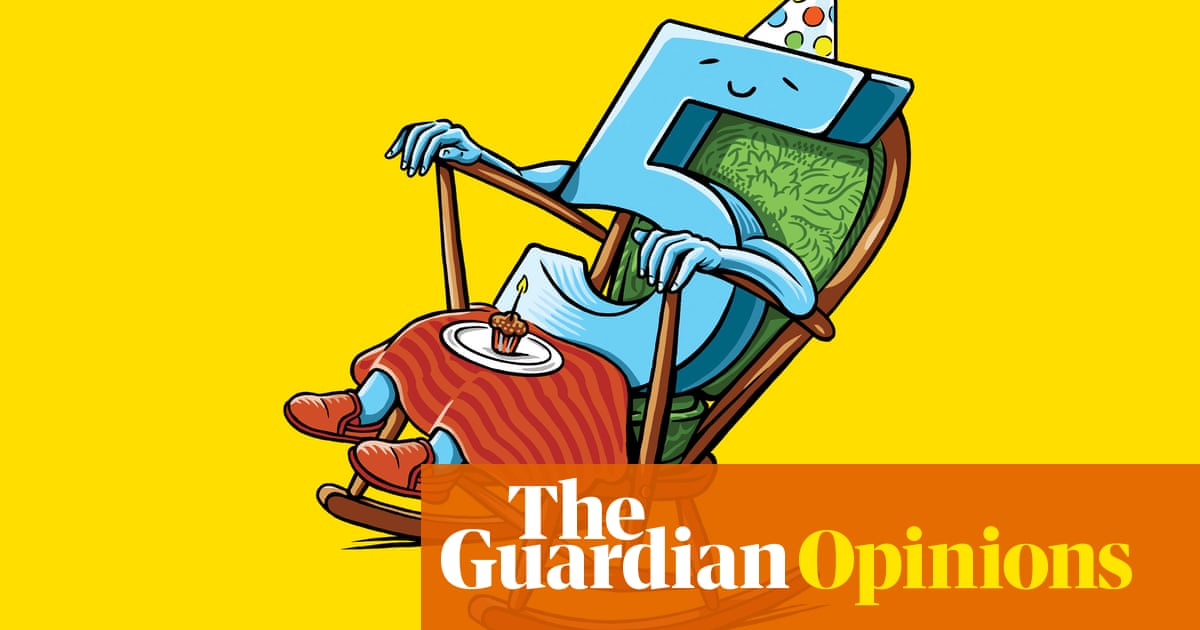In January 1993 there were 10 websites. Not 10 websites dedicated solely to changing the transmission fluid in a Lexus LS 400 saloon, or 10 websites dissecting the moral universe of Don’t Tell Mom the Babysitter’s Dead. Ten websites, as they say in America, period. That was the whole of the internet.
Fast forward to March 1994 and the new frontier was hastily being settled. Scan down the list of websites registered that year – Microsoft, BBC online, Yahoo, plus of course Bianca’s Smut Shack and Sex.com, who were, if we’re honest, really on to something – and there is a sense of an empire rising in the shadows, the architecture of a vast new world being quietly winched into place.
Not that many people noticed at the time. The most important British media event of March 1994 was the launch of BBC Radio 5 Live, the nation’s first easy-access rolling news and sport channel, a 30-year anniversary the BBC has been impressively relentless in publicising this week.
Understandably so. Everyone’s got to make a living, and this is all necessary self-advertisement. Even if in this case it must arrive in that familiarly cult-ish BBC tone, as though what we’re talking about is the birth of a miracle talking horse, as opposed to a platform for live sport, news-argument and Gordon from Egham who wants to talk about bollards.
Is 5 Live really as beloved, as vital, as culturally significant as it, 5 Live, seems to think? Probably not. But it has undeniably been a success, expert in curating the big shared moments as well as the smaller ones, a high quality platform for women in sport behind and in front of the mic, and a finishing school for some really good broadcasters.
Of the current roster John Murray is a master of football presentation, providing fond, insightful coverage that is also non-partisan, non-banterish and non-editorialising. Victoria Derbyshire could present anything from a prime ministerial resignation to the world parmesan cheese grating championships and it would just be really good and involving and informed.
Otherwise, while it is difficult to have many really strong feelings about 5 Live, it is also hard to dismiss the feeling its anniversary means something. Mainly because its entire lifespan coincides with the thing that has actually happened over those three decades, the rise of the internet as the most powerful cultural medium on earth. And because this in particular makes it a good moment to linger on the founding paradox of 5 Live, the beautiful lie that underpins its existence.
Radio lore says the idea for a dedicated news and sport channel came initially from the popularity of the BBC’s rolling coverage of the Gulf war. There was a general sense back then of ground to be seized: new platforms, satellite TV, digital rights, the growth of sport as a light entertainment commodity, with a sense sport would also be central to the grail of an unceasing “interactive” dialogue.
This is the central myth of 5 Live: the idea that it could, via a series of comprehensive BBC focus group sessions, locate the emotional centre of middle England, that there actually is a middle England capable of having an emotional centre, and that this would be a good thing. Somewhere out in the white heat of this new dawn (ie medium wave radio) was a place where Yaris Woman meets Ginsters Man, a village square of a Britain that is tolerant but also unchanging, a place were someone will give you a glass of Ribena when you fall off your bike outside their house, where Tony Blair is going to fix everything by not wearing a tie, where probably your grandparents were racist but aren’t any more because of meeting people and Daley Thompson.
Where that sweet, still centre can be accessed via the radio equivalent of sitting on a bench outside a motorway service station eating a coronation chicken baguette and talking about the need for a national public register of paedophiles. And that, yes, you can get to this place, this secret garden, by broadcasting David Mellor’s post-match football opinions every Saturday for 10 years.
A beautiful dream. But also, it turns out, one that was too good for this world. The thing that actually happened in that time period is, of course, the rise of the internet and social media, 5 Live’s super-villain cousin. It turns out the actual nation’s conversation is relentless, atomised, angry, divisive and almost entirely incoherent.
after newsletter promotion
Sport’s contribution to this has been significant. It provides the tonal quality of that voice, the one that never stops, sport as banter, tribalism, inane debate of toxic non-issues, the voice of a man with a pork pie jammed in his maw, shirtless outside a Nisa local, shouting incorrect statistics about VAR-based refereeing conspiracies.
This has been a terrible development for the BBC, which is supposed to be something other than the loudest voice and the hottest take, which is simultaneously unable to pursue a wholly commercial direction while also worrying about losing its reach. 5 Live has gone from 5.5m to 5.25m listeners in its anniversary quarter. GB News Radio is up. TalkSport and TalkRadio are up (Radio X Classic Rock is, incidentally, going gangbusters).
These latest figures were accompanied by a mandarin going on about choice and the need to provide what people want, or think they want, which still sounds like a terrible idea. The BBC shouldn’t do any of that. Be more Derbyshire. Less banter-posse. Inform and educate. This is what it can still do.
By contrast that shared digital space feels wild, spooked, hard to read or pander to., But then it is a pretty frightening idea, the ability to instantly hear and see the thoughts of seven billion people, filtered via an algorithm that shunts the most alarming right into your line of vision. Little wonder we might see ghosts and monsters, a London full of rats who want to stab you, thousands of furiously masturbating incels, the woke mob – an actual genuine mob – coming for your hot cross buns.
In this context the lost dream of 5 Live and its village square might actually be closer to the mode, or at least a good place to hide. Lie to me a little longer. Give me Chris Sutton’s gentle tea-time chidings and a phone-in on bin collection times. Talk to me about sausage rolls while the world burns.











